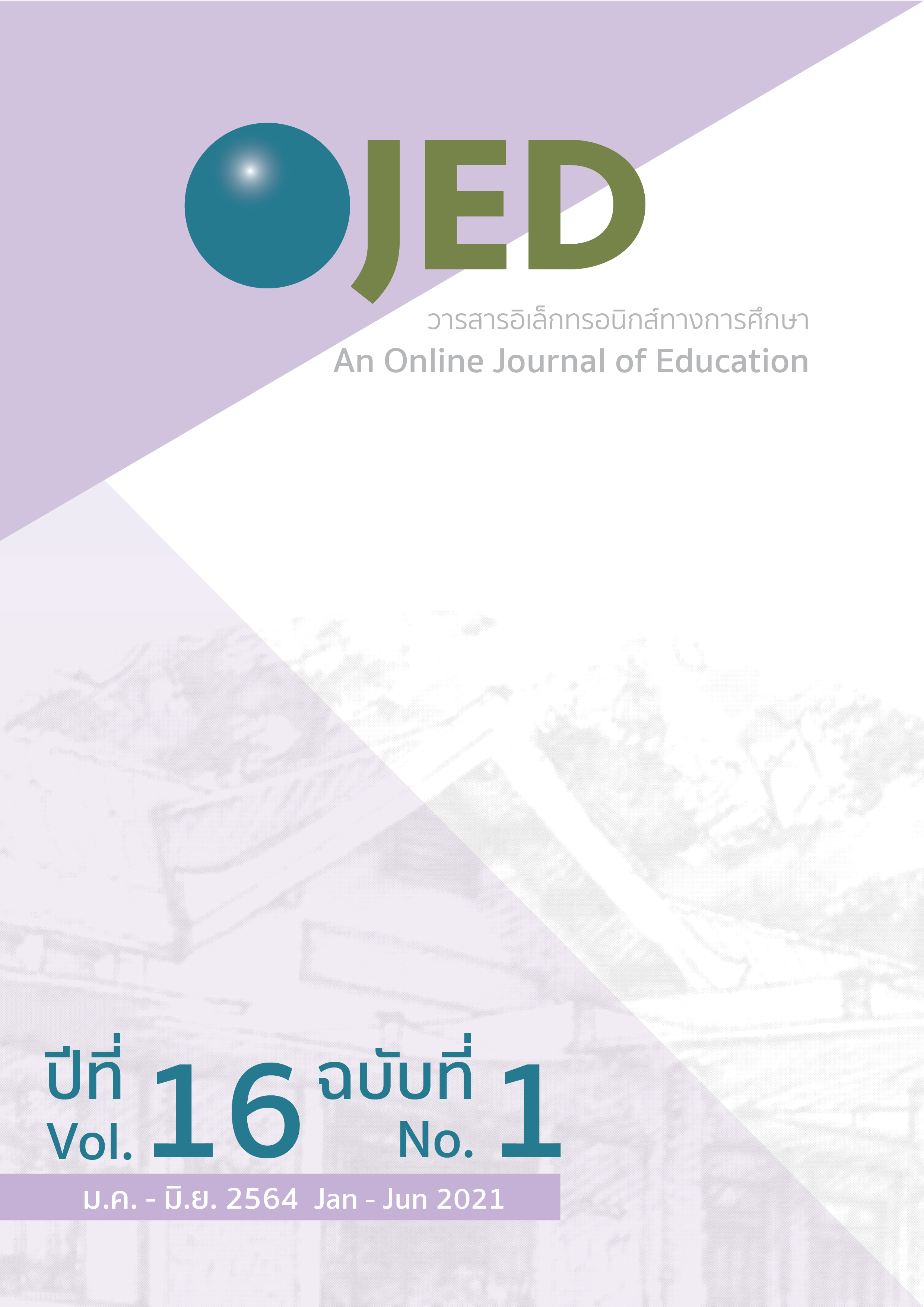Development of Prosocial Behavior through Music Classroom in Non-formal Private School
DOI:
https://doi.org/10.14456/ojed.2021.14Keywords:
prosocial behavior, music classroom, non-formal private schoolAbstract
The purpose of this research was to identify guidelines for the development of prosocial behaviors in students in music classrooms in non-formal private schools. The key informants were music teachers and top-level management in non-formal private schools which specialize in teaching music. The data collecting method consisted of: 1) questionnaire, and 2) interview form. The research results indicated that: 1) Music teachers can develop prosocial behaviors in their students by using positive reinforcement as well as by acting as a good role model; 2) Having advanced psychological skill in teaching music is the most challenging issue for developing prosocial behaviors in private lessons; 3) The most desirable prosocial behavior that music teachers hoped to see was that students would use music knowledge for betterment of society; and 4) Prosocial behavior development guidelines should be aligned with the curricula in 5 core aspects. These aspects are (1) Teaching Content, which is music knowledge; (2) Teaching Objective, which is teaching music and developing prosocial behaviors at the same time; (3) Lesson Plan, which must be personalized in order to fully understand and meet students’ individual needs; (4) Academic In-class Activities, which aim to provide practical and hands-on experiences for students; and (5) Learner Experience Out-of-the-class Activities, which are created by teachers in order to encourage students to learn to peacefully coexist with others.
References
ภาษาไทย
ใจทิพย์ เชื้อรัตนพงษ์. (2539). การพัฒนาหลักสูตร : หลักการและแนวปฏิบัติ. อสีนเพรส.
ชาย โพธิสิตา. (2562). ศาสตร์และศิลป์การวิจัยเชิงคุณภาพ : คู่มือนักศึกษาและนักวิจัยสังคมศาสตร์ (พิมพ์ครั้งที่ 8). อมริทร์พริ้นติ้งแอนรีพับลิชชิ่ง.
ณรุทธ์ สุทธจิตต์. (2541). จิตวิทยาการสอนดนตรี. สำนักพิมพ์แห่งจุฬาลงกรมหาวิทยาลัย.
ณรุทธ์ สุทธจิตต์. (2561). ดนตรีศึกษา : หลักการและสาระสำคัญ. สำนักพิมพ์แห่งจุฬาลงกรณ์มหาวิทยาลัย.
สุชาดา กลางสอน. (2558). ผลของการเสริมแรงทางบวกต่อพฤติกรรมก่อกวนในชั้นเรียนของเด็กสมาธิสั้น. วารสารศึกษาศาสตร์ ฉบับวิจัยบัณฑิตศึกษา มหาวิทยาลัยขอนแก่น, 9(4), 212-219.
สุภาวดี ธนะศรี. (2531). การศึกษาเปรียบเทียบประสิทธิภาพของการใช้การชี้แนะ การเสริมแรงทางบวก และ การค่อยถอดถอนต่อการเพิ่มและการคงอยู่ ของพฤติกรรมการเข้าร่วมกิจกรรมในชั้นเรียน [วิทยานิพนธ์ปริญญามหาบัณฑิต ไม่ได้ตีพิมพ์]. จุฬาลงกรณ์มหาวิทยาลัย.
ราชบัณฑิตยสถาน. (2553). พจนานุกรมศัพท์จิตวิทยา ฉบับราชบัณฑิตยสถาน. ไอเดีย สแควร์.
ภาษาอังกฤษ
Bandura, A., Ross, D., & Ross, S. A. (1961). Transmission of aggression through the imitation of aggressive models. Journal of Abnormal and Social Psychology, 63, 575-582.
Bierhoff, H. W. (2002). Prosocial behavior. Psychology.
Dovidio, J. F., Pillavin, J., Schroeder, D., & Penner, L. (2006). The social psychology of prosocial behavior. Psychology.
Halliwell, S. (2011). The Routledge companion to philosophy and music. Taylor & Francis Group.
Ilari, B., Fesjian, C., & Habibi, A. (2018). Entrainment, theory of mind, and prosocial in child musician. Music and Science, 1, 1-11.
Mussen & Eisenberg. (1977). Root of caring sharing, and helping: The development of pro-social behavior in children. W. H. Freeman and Company.
Skinner, B. F. (1971). Beyond freedom and dignity. Knopf.
Willamson, R. A., Donohue, M. R., & Tully, E. C. (2013). Learning how to help others: Two-year-olds’ social learning of prosocial act. Journal of Experimental Child Psychology, 114(4), 543-550.
Downloads
Published
How to Cite
Issue
Section
License
Copyright (c) 2021 An Online Journal of Education

This work is licensed under a Creative Commons Attribution-NonCommercial-NoDerivatives 4.0 International License.




